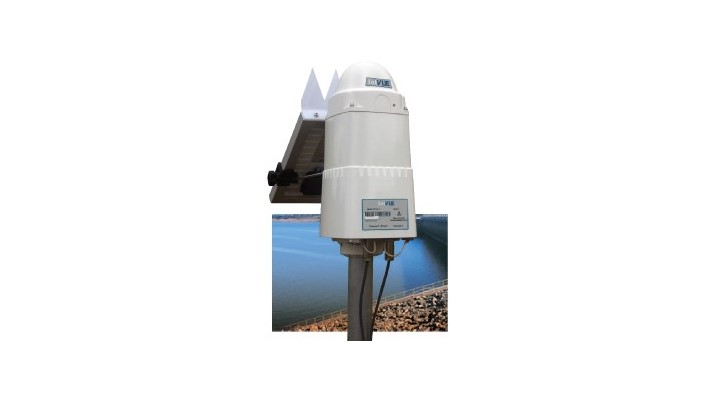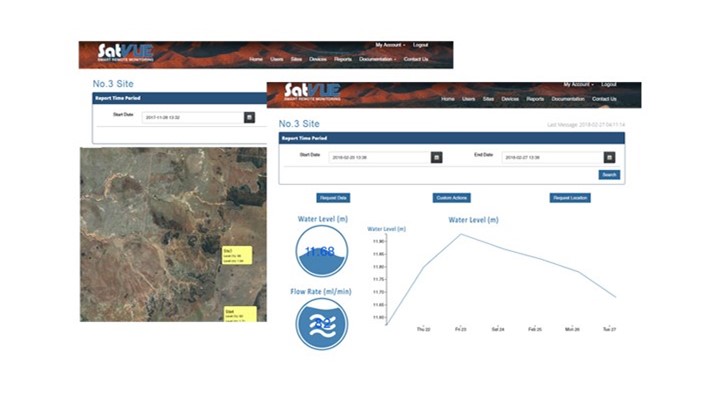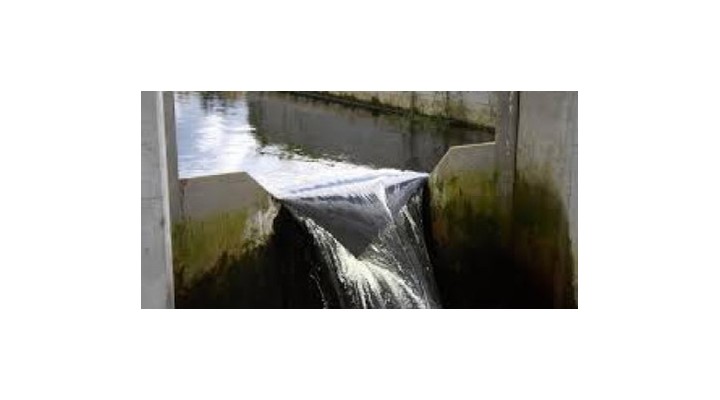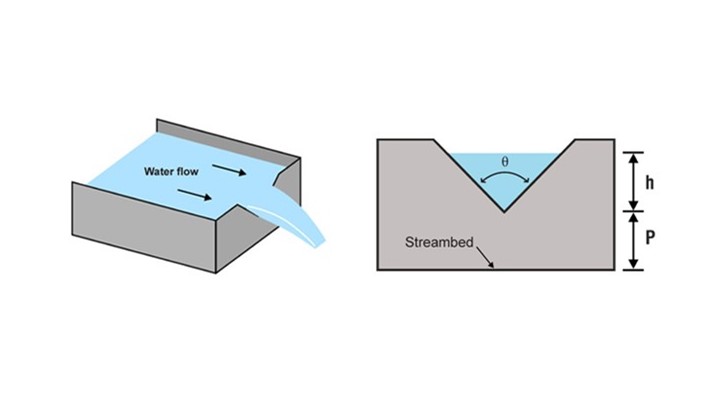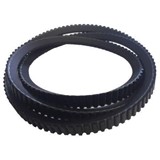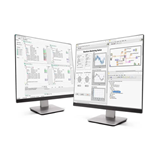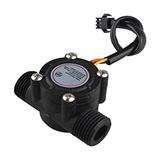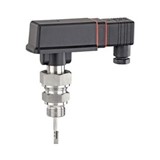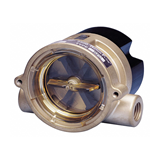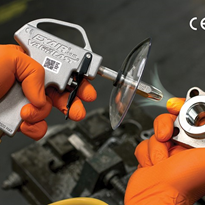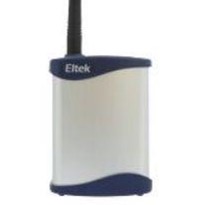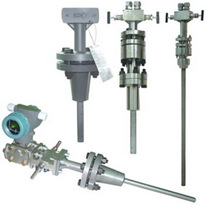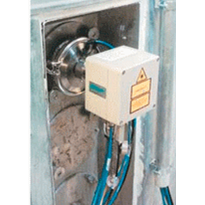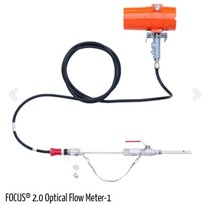'‘In addition to the SatVUE solution minimalising potential safety concerns, the organisation immediately obtained significant improvements to their operational procedures due to improved data visibility.’
Typically installed in open channels, the function of a V-notch weir is to determine discharge (flow rate) from a body of water, such as a dam or stream.
The basic principle in determining the flow rate is that the discharge of water is directly related to the water depth above the crotch (bottom) of the V; this distance is called head (h).
Due to the V-notch design, even small changes in discharge cause a large change in depth allowing more accurate head measurement.
Further calculations are also factored in such as open channel flow rate and the average depth between the streambed and base of the weir crest (P).
Improving operational efficiency
A large North QLD power station were seeking ways to improve Workplace Health & Safety procedures, and operational efficiency, when it comes to V-notch weir flow monitoring on their dams.
Previously, the workers had been using boats to access V-notch weirs to manually conduct level measurements in order to calculate flow rates.
This was deemed to be an unnecessary safety risk due to potential instability when navigating small vessels to obtain manual level measurements.
It was also very cost-prohibitive due to the number of sites that had to be monitored.
Technology that delivers - remotely!
Investigations by the power station into an automated, more cost-effective and ultimately safer method of obtaining this information lead them to the SatVUE Smart Remote Monitoring Solution.
By installing a SatVUE and submersible level sensor at one of the V-notch weir locations, level measurements are obtained and transmitted at hourly intervals, via satellite communications.
With the SatVUE programmed to also calculate the flow rate, this data can be viewed both ‘back at base’ and offsite via a remote web portal.
Alert capabilities ensure timely response
Alarms have also been programmed into the SatVUE system enabling email alerts to be sent to site staff should any pre-determined should any thresholds be breached.
The Result?
In addition to the SatVUE solution minimalising potential safety concerns, the organisation immediately obtained significant improvements to their operational procedures due to improved data visibility.
This will ultimately result in more effective and timely responses to any issues that could potentially arise. They are now looking to implement the SatVUE system across multiple sites that they operate from.
The Benefits
• peace of mind that Workplace OH & S requirements are being met
• improve operational efficiency and provide greater visibility
• custody of data and minimisation of data transposition errors
• remote access from any web-enabled device
• ease of installation
Click here to download a copy of this article
- Suppliers
- New to IndustrySearch? Book a Demo
- Advertise with us
- Login
- Email Marketing
- Buyers
- Get Quotes
- Articles & Ideas
- Login
- Subscribe to newsletter
- My Details
- Get Quotes
- Automation & Control
- Automotive Workshop Equipment
- Cleaning Equipment
- Construction & Heavy Machinery
- Conveyor Systems & Components
- Cranes & Hoists
- Electrical & Power Generation Equipment
- Electronic Components
- Farming & Agriculture
- Food & Beverage Processing
- Forklifts & Attachments
- Hydraulic & Pneumatic Equipment
- Industrial Materials, Tools & Components
- Industrial Pumps
- IT Hardware & Industrial Computing
- IT Software & Applications
- Laboratory Equipment & Instruments
- Manufacturing & Industrial Equipment
- Material Handling & Lifting
- Metalworking & Machining
- Mining Equipment & Machinery
- Packaging & Labelling Machinery
- Pallet Management
- Personal Protective Equipment
- Security & Surveillance
- Test & Measurement
- Transport Equipment
- Trucks & Trailers
- Warehouse Storage & Racking
- Waste & Environmental Management
- Welding Machines & Accessories
- Woodworking & Joinery Machines
- Workplace Equipment
- Workplace Safety Equipment
- Get Quotes
- Automation & Control
- Automotive Workshop Equipment
- Cleaning Equipment
- Construction & Heavy Machinery
- Conveyor Systems & Components
- Cranes & Hoists
- Electrical & Power Generation Equipment
- Electronic Components
- Farming & Agriculture
- Food & Beverage Processing
- Forklifts & Attachments
- Hydraulic & Pneumatic Equipment
- Industrial Materials, Tools & Components
- Industrial Pumps
- IT Hardware & Industrial Computing
- IT Software & Applications
- Laboratory Equipment & Instruments
- Manufacturing & Industrial Equipment
- Material Handling & Lifting
- Metalworking & Machining
- Mining Equipment & Machinery
- Packaging & Labelling Machinery
- Pallet Management
- Personal Protective Equipment
- Security & Surveillance
- Test & Measurement
- Transport Equipment
- Trucks & Trailers
- Warehouse Storage & Racking
- Waste & Environmental Management
- Welding Machines & Accessories
- Woodworking & Joinery Machines
- Workplace Equipment
- Workplace Safety Equipment
Trusted by 1.2 million Australian industrial buyers
Buyers
- Discover products & solutions
- Login
- Subscribe To Newsletter
- Browse All Products
- Read Articles
Suppliers
Advertise
- Promote your products & solutions
- New to IndustrySearch? Book a Demo
- Login / Forgot Password
- Advertise Your Products
- Success Stories
- Email Marketing
- Suppliers
- Advertise with us
- Login
- Email Marketing
- Buyers
- Get Quotes
- Articles & Ideas
- Login
- Subscribe to newsletter
- My Details
Get Quotes
- Automation & Control
- Automotive Workshop Equipment
- Cleaning Equipment
- Construction & Heavy Machinery
- Conveyor Systems & Components
- Cranes & Hoists
- Electrical & Power Generation Equipment
- Electronic Components
- Farming & Agriculture
- Food & Beverage Processing
- Forklifts & Attachments
- Hydraulic & Pneumatic Equipment
- Industrial Materials, Tools & Components
- Industrial Pumps
- IT Hardware & Industrial Computing
- IT Software & Applications
- Laboratory Equipment & Instruments
- Manufacturing & Industrial Equipment
- Material Handling & Lifting
- Metalworking & Machining
- Mining Equipment & Machinery
- Packaging & Labelling Machinery
- Pallet Management
- Personal Protective Equipment
- Security & Surveillance
- Test & Measurement
- Transport Equipment
- Trucks & Trailers
- Warehouse Storage & Racking
- Waste & Environmental Management
- Welding Machines & Accessories
- Woodworking & Joinery Machines
- Workplace Equipment
- Workplace Safety Equipment
Get Quotes
- Automation & Control
- Automotive Workshop Equipment
- Cleaning Equipment
- Construction & Heavy Machinery
- Conveyor Systems & Components
- Cranes & Hoists
- Electrical & Power Generation Equipment
- Electronic Components
- Farming & Agriculture
- Food & Beverage Processing
- Forklifts & Attachments
- Hydraulic & Pneumatic Equipment
- Industrial Materials, Tools & Components
- Industrial Pumps
- IT Hardware & Industrial Computing
- IT Software & Applications
- Laboratory Equipment & Instruments
- Manufacturing & Industrial Equipment
- Material Handling & Lifting
- Metalworking & Machining
- Mining Equipment & Machinery
- Packaging & Labelling Machinery
- Pallet Management
- Personal Protective Equipment
- Security & Surveillance
- Test & Measurement
- Transport Equipment
- Trucks & Trailers
- Warehouse Storage & Racking
- Waste & Environmental Management
- Welding Machines & Accessories
- Woodworking & Joinery Machines
- Workplace Equipment
- Workplace Safety Equipment
Trusted by 1.2 million Australian industrial buyers


